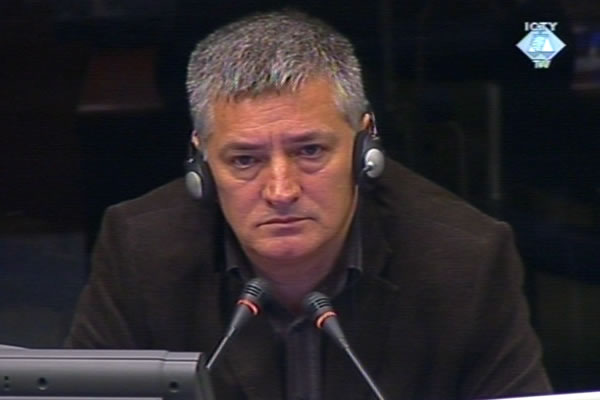Home
KARADZIC: GENERAL CHAOS AND HIS AIDE FEAR
Former member of the VRS Sarajevo-Romanija Corps Milomir Soja testifies at the trial of Radovan Karadzic. In 1995, Soja was involved in modifying air bombs. The accused wasn’t feeling well today and evidence of other witnesses scheduled for this week was canceled. The trial continues on Tuesday, 5 October 2010
 Milomir Soja, witness at the Radovan Karadzic trial
Milomir Soja, witness at the Radovan Karadzic trial A written statement by Milomir Soja was admitted into evidence as a prosecution exhibit as the trial of Radovan Karadzic continued. Soja served for a while as a soldier in the Sarajevo-Romanija Corps, working on improving the launching systems of the so-called modified air bombs. Soja already talked about his role in production of those bombs – nicknamed ‘sows’ because of their great destructive power and low accuracy – at the trial of former SRK commander General Dragomir Milosevic. Milosevic was sentenced to 29 years in prison for his part in the artillery and sniper terror campaign in Sarajevo and Radovan Karadzic faces the same charges.
Today the prosecutor read out the summary of the statement: the witness got a job in Energoinvest in Ilidza after he was demobilized in 1994. As an electronics engineer, Soja had worked there before the conflict. In the spring of 1995, Soja was called to help a team working on modifying the air bomb launching systems. Air bombs were used to target Sarajevo. In the summer of 1995, Soja was present when one such bomb was launched from the VRS position in the Kasindolska Street.
As the witness said, he was opposed to modifying the air bomb launching systems because it made them less accurate. The modified air bomb that was launched in his presence missed its target and hit the territory under the VRS control, the witness claimed. As far as the witness knew, the VRS had five modified air bomb launchers – two located in Ilidza, one each in Vogosca and Ilijas and one was in Blazuj.
Contrary to Dragomir Milosevic’s defense case, which was that the witness was present when ‘an ordinary projectile’ was launched, Karadzic in his cross-examination didn’t contest that air bombs were indeed modified. Using a BH Army bulletin, Karadzic tried to show that the air bomb launched in the witness’s presence was fired on a military target.
Karadzic suggested that the part of Stup where the target – the refrigeration plant – was located was ‘a hotspot in the war zone’ with fighting going on during the entire war. The plant itself was ‘the focal point of the Muslim combat plans’, Karadzic noted. Karadzic tried to justify the targeting of the RTV building, which was hit with a modified air bomb. That building too, Karadzic argued, was located in the middle of an industrial zone.
In the cross-examination of the witness, Karadzic seized the opportunity to expand his argument about ‘the self-organized Serb nation’, impossible to control. The witness confirmed that in Osijek, a neighborhood in Sarajevo, Serbs ‘organized themselves’ and established night watches ‘out of fear’. Serbs were ‘unprepared when the war started’ because they expected help from the JNA and Yugoslav authorities, the witness explained. ‘I have already promoted general Chaos’, now you introduced his aide, Fear’, Karadzic replied, quite satisfied with the witness’s answer.
Karadzic wasn’t feeling well today and the trial was adjourned after the first session. Other prosecution witnesses scheduled to give evidence this week were cancelled. Details about Karadzic’s health were discussed in closed session. The trial continues on Tuesday, 5 October 2010.
Linked Reports
- Case : Karadzic
- 2010-09-29 KARADZIC: DARKNESS FELL AT 4 PM IN SARAJEVO
- 2010-09-28 KARADZIC: TRAM TRACKS AIN'T WHAT THEY USED TO BE
- 2010-09-27 CIVILIANS TARGETED BY SNIPERS
- 2010-10-01 INTERCEPTS REMAIN IN EVIDENCE AGAINST KARADZIC
- 2010-10-05 HOW KARADZIC’S ‘GOOD DEED’ TURNED INTO EVIDENCE FOR PROSECUTION
- 2010-10-06 KARADZIC: NO RECONCILIATION IF WE SHELLED THE MARKALE TOWN MARKET
